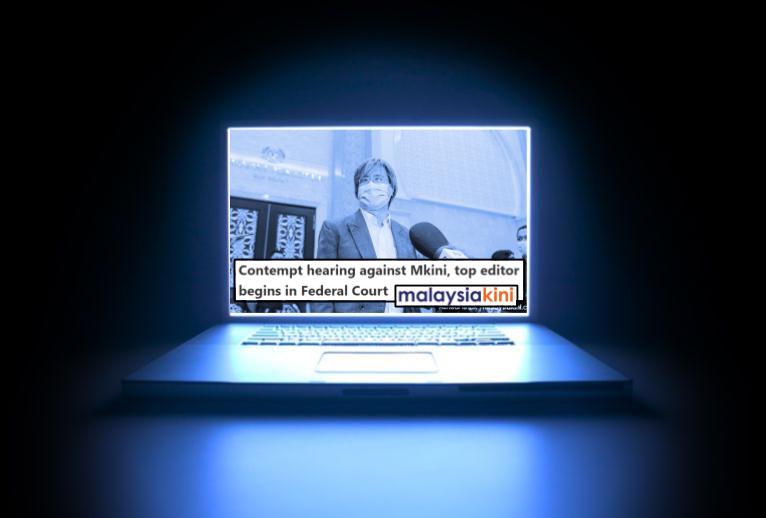Digital media has democratised the space for expression at a rate so fast that law and order have time and again found the need to play catch up. Once again, we have been caught in another pickle – the case with Malaysiakini and its run in with contempt of court. A poignant photo of Steven Gan, the portal’s founding editor has sparked commentary that media freedom is under siege, and that this sets a dangerous precedent on a core democratic right – the freedom of expression. Or does it not as it is an act to uphold the integrity of our judiciary?
As we grapple with this debate, much admiration has to be accorded to both defendant and prosecution to explore a path forward for justice. Popular support has naturally rallied around Gan, however my legal opinion is that the contempt proceeding against him and the portal has valid basis. If Malaysiakini vouches to be at the forefront of journalism and wants to explore the boundaries of what constitutes freedom of expression, it must be also ready to interact with the interpretation of how Malaysia’s legal framework surrounds its practice. The courts in their wisdom have made the first move.
The contempt proceedings is over five readers’ comments which appeared in the comment site of an article published on the news portal entitled “CJ orders all courts to be fully operational from July 1” on June 9 which allegedly scandalised the judiciary. Court of Appeal president Datuk Rohana Yusuf has since declared to be “contemptuous” in nature. Attorney General (AG) Tan Sri Idrus Harun clarified that those comments “clearly meant that the judiciary committed wrongdoings, is involved in corruption, does not uphold justice and compromised its integrity.”
The commentors were merely expressing their dissenting views, disagreeing with the acquittal of a former chief minister, and lamenting over what they perceived to be the current state of the Malaysian courts. This is the crux of the debate – were those statements in contempt and why is the publisher at fault? Given that it is now a case, it can also infer that being a publisher carries with it libel risks, especially when the burden to answer for unsolicited and free commentary by other people and readers falls under the responsibility of the publisher, in this case Malaysiakini that had given such space for comments on their portal.
Due to these undefined parameters, former Communications and Multimedia Minister Gobind Singh Deo announced in March last year that his Ministry was already drafting new laws that will hold news portals responsible over their readers’ comments, should such comments go too far. This is in line with the European Court of Human Right’s 2015 ruling (PDF) that commercially-run internet news portals are liable for their readers’ comments, because although the portals did not actually write the offensive comments, they had direct control over the comment environment and therefore their involvement in making the comments visible on the platform had gone beyond that of a passive service provider.
But is this contempt? What is contempt of court? Because contempt of court is not clearly defined in Malaysia, the Bar Council even published a Memorandum in 1999 titled “On the Need to Define the Law of Contempt and to Provide for Certainty in its Application and Enforcement” in which they pinned it down to the lack of a Contempt of Court Act that would clearly set forth the ingredients for the offence and accompanying penalties. Without statutory basis in Malaysia, the Courts would have to reply on a raft of English, Commonwealth as well as Malaysian cases dating back to the days of the British Empire as authority.
As a general rule of thumb, contempt of court must be: scandalising the court; abusing parties who are concerned in the cause that court is presently handling; and prejudging the public before the cause is heard. In the Malaysian courts, the best description of contempt of court is that it is “intended to ‘protect’ the administration of justice”, as Balia Yusof Wahi J so aptly puts it in the case of Perbadanan Pembangunan Pulau Pinang v Tropiland Sdn Bhd [2009] 3 AMR 738. The principle therein is that the courts “have an inherent jurisdiction to ensure the proper administration of justice”, and is therefore empowered to enter into contempt proceedings in order to ‘protect’ the integrity of the judicial process.
Whether the five comments on Malaysiakini fall within the ambit of contempt and ‘scandalizing the courts’ or not, we will soon know. In the meantime, if hypothetically it does, then the Court of Appeal’s Datuk Dr Hamid Sultan Abu Backer (who incidentally recently came out to call for the end of the use of contempt proceedings to silence media freedom) would fall squarely within the AG’s crosshairs for his bold exposé last year about interference in the Malaysian judiciary.
However, of course the august Court would know better than me, and I also would not entirely rule out that the comments had indeed ‘caused an erosion of public confidence in the courts’, and so we now await the Federal Court’s actual contempt of court proceedings against Malaysiakini on July 13. I can only hope that justice will prevail and that the sacrosanct right to the freedom of expression will triumph.


